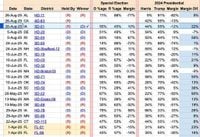On August 26, 2025, a political tremor shook Iowa’s State Senate as Democrat Catelin Drey captured a seat long held by Republicans, breaking the GOP’s supermajority and signaling a potential shift in the state’s—and perhaps the nation’s—political winds. Drey’s victory over Republican Christopher Prosch in Senate District 1, a region President Donald Trump carried by 11 points just a year earlier, has Democrats celebrating and Republicans regrouping. The special election was called after the death of Republican Sen. Rocky De Witt in June from pancreatic cancer, leaving a vacancy that quickly became a battleground for both parties.
According to preliminary results from the Woodbury County Auditor’s Office, Drey secured 55% of the vote, totaling 4,208 votes, while Prosch received 44%, or 3,411 votes. This was no narrow squeaker—Drey’s double-digit margin is being hailed by Democrats as proof that their message is resonating, even in reliably red territory. As FOX 9 reported, this is the second time in 2025 that Democrats have managed to flip a Republican-controlled state Senate seat in Iowa; the first came in January, when Democrat Mike Zimmer won in a district Trump had carried by more than 20 points.
The immediate implications of Drey’s win are substantial. By breaking the Republican supermajority, Democrats have gained new leverage in the state Senate. The chamber now stands at 33 Republicans and 17 Democrats, and crucially, Republicans no longer have the two-thirds majority required to confirm the governor’s appointees without some Democratic support. As The Hill explained, this shift ensures that nominees from the governor can’t be rubber-stamped along party lines, giving Democrats a seat at the table in key decisions.
National Democrats were quick to trumpet the result. Ken Martin, chair of the Democratic National Committee (DNC), said in a statement, “Iowans are seeing Republicans for who they are: self-serving liars who will throw their constituents under the bus to rubber stamp Donald Trump’s disastrous agenda — and they’re ready for change. They are putting Republicans on notice and making it crystal clear: any Republican pushing Trump’s unpopular, extreme agenda has no place governing on behalf of Iowa families.” Martin added, “That’s why all year long, Iowans have been electing Democrats ready to fight for working Iowans. Make no mistake: when Democrats organize everywhere, we win everywhere, and today is no exception.”
The DNC’s involvement in the race was extensive. According to ABC News, the party mobilized more than 30,000 volunteers for get-out-the-vote efforts, including text and phone banks in partnership with the Iowa Democratic Party. DNC Chair Ken Martin emphasized that the party had learned from past mistakes, stating, “Rebuilding the party starts from the ground up.” The scale of the operation was not lost on Republicans, who argued that the low-turnout race was more a product of national Democratic intervention than a true reflection of Iowa’s political mood. Iowa Republican Party chair Jeff Kaufman commented on social media, “National Democrats were so desperate for a win that they activated 30,000 volunteers and a flood of national money to win a state senate special election by a few hundred votes.”
Still, the numbers are hard to ignore. Drey’s win in a district Trump carried by 11 points is part of a broader pattern in 2025, with Democratic candidates in special elections running about 16 percentage points ahead of Kamala Harris’s margin versus Trump in the 2024 presidential election, according to Strength In Numbers. This trend is reminiscent of the Democratic overperformance seen in the 2017 special elections, but this year’s numbers are even higher, suggesting a pronounced leftward shift in the electoral environment.
Democrats are keen to frame these victories as a repudiation of Trump’s agenda and a sign of growing momentum heading into the 2026 midterms. Heather Williams, president of the Democratic Legislative Campaign Committee, called the special election wins a “flashing warning” to Trump and the GOP, asserting that voters are rejecting the “failing MAGA agenda.” Williams added, “State legislative Democrats are delivering progress, responding to their communities’ concerns about the chaos in Washington, and providing the steady leadership voters are asking for — leadership that has propelled candidates like Sen.-elect Catelin Drey to victory this year.”
But what drove voters in this deeply Republican district to embrace a Democrat? Drey’s campaign focused squarely on affordability, tapping into concerns about the rising cost of living and economic insecurity. As Strength In Numbers noted, Drey’s agenda resonated with voters who felt left behind by both national and state-level politics. The newsletter pointedly asked, “Is affordability the Democratic Party’s secret weapon in 2026?” Drey herself leaned into her personal story and practical approach, with the campaign slogan: “When you need a mess cleaned up, you send mom.”
Republicans, meanwhile, have cautioned against reading too much into the special election results. They argue that turnout in off-year races is often unrepresentative and that the influx of national money and volunteers skewed the contest. As Kaufman’s social media post suggested, the party remains confident that its core voters will return in force for the midterms. Yet, the loss of the supermajority is a tangible blow, limiting the GOP’s ability to advance its agenda without at least some bipartisan support.
This Iowa race is not an isolated incident. Democrats have also notched special election victories in other Trump-friendly districts, including a Pennsylvania state Senate seat in March. According to the DNC, Democrats have won or overperformed in 37 out of 38 key elections this year—a remarkable record in an era of polarized politics and low presidential approval ratings. For a party still reeling from losses in the 2024 elections, these wins offer a glimmer of hope and a roadmap for future campaigns.
Of course, one special election in a single state Senate district can only tell us so much. Political analysts caution against extrapolating too broadly from a single contest, especially in an off-year. But there’s no denying that Drey’s win has energized Iowa Democrats and put Republicans on notice. As ABC News observed, the result “suggests Democratic voters may be more engaged heading into next year’s elections, where control of Congress is at stake.”
Looking ahead, both parties will be watching Iowa closely. For Democrats, the challenge will be to sustain this momentum and translate special election successes into broader gains in 2026. For Republicans, the task is to regroup, re-energize their base, and counter the Democratic surge. The stakes are high, and as the dust settles from this special election, the battle for Iowa—and perhaps the nation—appears far from over.
With the supermajority broken and the political landscape shifting, the next chapter in Iowa’s political story is wide open, and both parties know the fight is just beginning.



